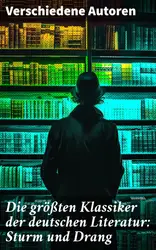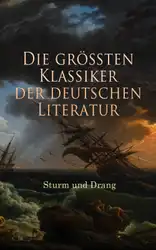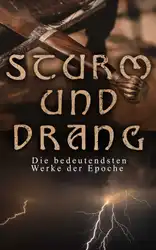Friedrich Maximilian Klinger's "Faustus his Life, Death, and Doom" presents a profound exploration of the Faustian archetype that has captivated writers and thinkers since the Renaissance. Written in 1791, the work blends elements of tragedy and philosophy, illustrating the decline of a once-great scholar who, in his desperate yearning for knowledge and power, makes a pact with the devil. Klinger's unique literary style combines vivid imagery with philosophical undercurrents, reflecting the heightened emotionalism of Sturm und Drang, a movement that emphasized individual experience and the tumultuous nature of human existence. Through this reimagining of the Faust legend, Klinger engages with themes of ambition, moral conflict, and existential dread that resonate with the Enlightenment era's burgeoning inquiry into individual agency and the nature of evil. Friedrich Maximilian Klinger (1752–1831) was an integral figure of early German Romanticism, whose formative experiences in a culturally rich milieu influenced his literary endeavors. A contemporary of Goethe, Klinger sought to assert a distinct narrative voice that questioned established norms. His own disillusionments with societal conventions and authority undoubtedly informed his portrayal of Faust as emblematic of the human condition's struggles against transgression and consequence. "Faustus his Life, Death, and Doom" is a must-read for anyone intrigued by the complexities of ambition and morality. Klinger's treatment of the Faustian theme invites readers to reflect on their own lives and the cost of their desires. In doing so, this work remains a cornerstone of German literature, urging modern audiences to confront the timeless dilemmas of human aspiration and the ethical boundaries that accompany it.
Faustus his Life, Death, and Doom
Commencez ce livre dès aujourd’hui pour 0 €
- Accédez à tous les livres de l'app pendant la période d'essai
- Sans engagement, annulez à tout moment
Auteur(e) :
Série :
Faustus his Life, Death, and DoomLangue :
anglais
Format :
STURM UND DRANG: Die bedeutendsten Werke der Epoche : Eine kühne Reise durch die leidenschaftliche Welt des Sturm und Drang
Johann Wolfgang von Goethe, Friedrich Schiller, Jakob Michael Reinhold Lenz, Gottfried August Bürger, Friedrich Maximilian Klinger, Wilhelm Heinse, Johann Gottfried Herder, Georg Christoph Lichtenberg, Johann Georg Hamann, Heinrich Wilhelm von Gerstenberg, Christian Friedrich Daniel Schubart, Matthias Claudius, Heinrich Leopold Wagner, Johann Anton Leisewitz, Johannes Friedrich Müller
bookDie größten Klassiker der deutschen Literatur: Sturm und Drang : Intensität und Leidenschaft: Sturm und Drang in der deutschen Klassik
Johann Wolfgang von Goethe, Friedrich Schiller, Jakob Michael Reinhold Lenz, Gottfried August Bürger, Friedrich Maximilian Klinger, Wilhelm Heinse, Johann Gottfried Herder, Georg Christoph Lichtenberg, Johann Georg Hamann, Heinrich Wilhelm von Gerstenberg, Christian Friedrich Daniel Schubart, Matthias Claudius, Heinrich Leopold Wagner, Johann Anton Leisewitz, Johannes Friedrich Müller
bookSTURM UND DRANG: Die bedeutendsten Werke der Epoche
Johann Wolfgang von Goethe, Friedrich Schiller, Jakob Michael Reinhold Lenz, Gottfried August Bürger, Friedrich Maximilian Klinger, Wilhelm Heinse, Johann Gottfried Herder, Georg Christoph Lichtenberg, Johann Georg Hamann, Heinrich Wilhelm von Gerstenberg, Christian Friedrich Daniel Schubart, Matthias Claudius, Heinrich Leopold Wagner, Johann Anton Leisewitz, Johannes Friedrich Müller
bookDie größten Klassiker der deutschen Literatur: Sturm und Drang
Johann Wolfgang von Goethe, Friedrich Schiller, Jakob Michael Reinhold Lenz, Gottfried August Bürger, Friedrich Maximilian Klinger, Wilhelm Heinse, Johann Gottfried Herder, Georg Christoph Lichtenberg, Johann Georg Hamann, Heinrich Wilhelm von Gerstenberg, Christian Friedrich Daniel Schubart, Matthias Claudius, Heinrich Leopold Wagner, Johann Anton Leisewitz, Johannes Friedrich Müller
bookDie größten Klassiker der deutschen Literatur: Sturm und Drang
Johann Georg Hamann, Heinrich Wilhelm von Gerstenberg, Christian Friedrich Schubart, Georg Christoph Lichtenberg, Wilhelm Heinse, Johann Gottfried Herder, Gottfried August Bürger, Matthias Claudius, Heinrich Leopold Wagner, Johann Wolfgang von Goethe, Jakob Michael Lenz, Friedrich Maximilian Klinger, Johann Anton Leisewitz, Johannes Friedrich Müller, Friedrich Schiller
bookSTURM UND DRANG: Die bedeutendsten Werke der Epoche
Friedrich Schiller, Johann Wolfgang von Goethe, Johann Gottfried Herder, Johann Georg Hamann, Heinrich Wilhelm von Gerstenberg, Christian Friedrich Schubart, Georg Christoph Lichtenberg, Wilhelm Heinse, Gottfried August Bürger, Matthias Claudius, Heinrich Leopold Wagner, Jakob Michael Lenz, Friedrich Maximilian Klinger, Johann Anton Leisewitz, Johannes Friedrich Müller
bookReisen vor der Sündfluth
Friedrich Maximilian Klinger
bookBetrachtungen und Gedanken über verschiedene Gegenstände der Welt und der Literatur
Friedrich Maximilian Klinger
bookGeschichte eines Teutschen der neuesten Zeit
Friedrich Maximilian Klinger
bookDie Geschichte Giafars des Barmeciden
Friedrich Maximilian Klinger
bookDramen
Friedrich Maximilian Klinger
book











